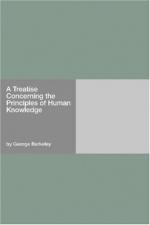66. Proper employment of the natural philosopher.—Hence, it is evident that those things which, under the notion of a cause co-operating or concurring to the production of effects, are altogether inexplicable, and run us into great absurdities, may be very naturally explained, and have a proper and obvious use assigned to them, when they are considered only as marks or signs for our information. And it is the searching after and endeavouring to understand those signs instituted by the Author of Nature, that ought to be the employment of the natural philosopher; and not the pretending to explain things by corporeal causes, which doctrine seems to have too much estranged the minds of men from that active principle, that supreme and wise Spirit “in whom we live, move, and have our being.”
67. Twelfth objection.—Answer.—In the twelfth place, it may perhaps be objected that—though it be clear from what has been said that there can be no such thing as an inert, senseless, extended, solid, figured, movable substance existing without the mind, such as philosophers describe Matter—yet, if any man shall leave out of his idea of matter the positive ideas of extension, figure, solidity and motion, and say that he means only by that word an inert, senseless substance, that exists without the mind or unperceived, which is the occasion of our ideas, or at the presence whereof God is pleased to excite ideas in us: it doth not appear but that Matter taken in this sense may possibly exist. In answer to which I say, first, that it seems no less absurd to suppose a substance without accidents, than it is to suppose accidents without a substance. But secondly, though we should grant this unknown substance may possibly exist, yet where can it be supposed to be? That it exists not in the mind is agreed; and that it exists not in place is no less certain—since all place or extension exists only in the mind, as has been already proved. It remains therefore that it exists nowhere at all.




